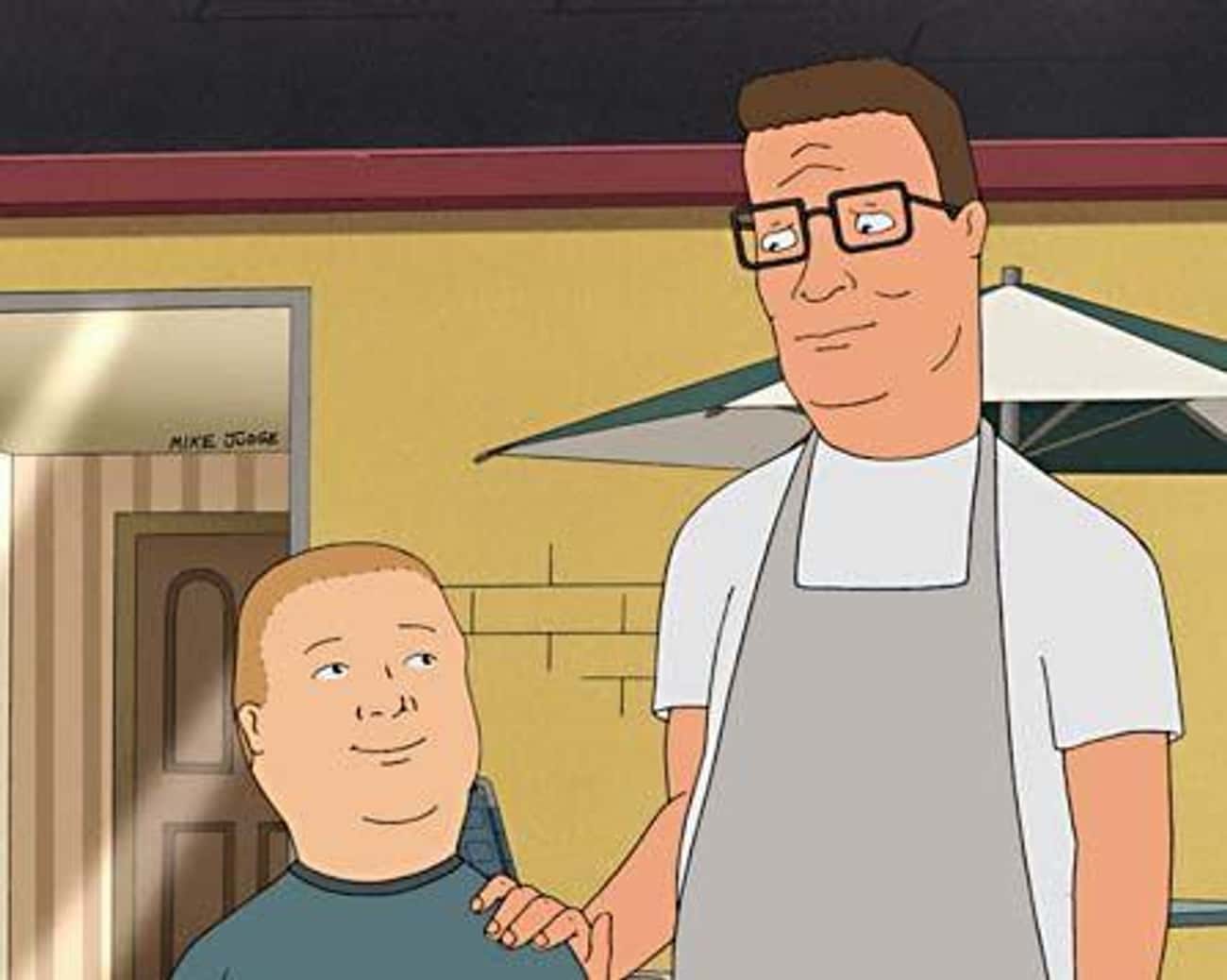Balancing Authority with Parental Rights
What King of the Hill can teach us about allowing the state too much control over the family.

"King of the Hill" is an animated television series that aired from 1997 to 2010. The show revolves around the life of Hank Hill as he navigates fatherhood through an ever-changing society. King of the Hill reflects the modern middle-class suburban family and their challenges. The show balances the friction between family relationships and the outside world, such as entertainment, corporations, and government.
Modern-day parents struggle to manage outside influences over their family. Intrusions happen through social media, Hollywood, and the government. King of the Hill was ahead of its time in understanding these challenges and wrote about them in a digestible way for average Americans. In the pilot episode, the first example we see is the influence of the State over the Hill family. The State is a big group, and the Hill family is a small group. This means the State holds more power. In cases of friction, the group with more power has an obligation to wield it judiciously.
We enter Arlen, a small suburban Texas town, and are introduced to Hank Hill and his family and friends. Hank is a red-meat, hot-tempered, blue-collar type of American. He sells propane and propane accessories. Hank is married to Peggy Hill. Peggy is an independent wife, mother, and substitute teacher of the year. Bobby Hill, their son, is an underachieving husky middle schooler. The Hills are neighbors with Hank’s childhood friends, Dale Gribble, Bill Dauterive, and Boomhauer.
A ball hits Bobby at his little league game. On the way home, Hank stops at his local Mega-lo-Mart. While in the store, Hank becomes frustrated with the incompetence of the customer service. His anger gets the best of him, and he makes a scene. There are whispers all over town about how Bobby got his black eye, and someone calls CPS to report Hank for child abuse.
Just before the social worker arrives at the Hills for the investigation, Bobby accidentally hits his mother on the head with a baseball. Hank is in the driveway working on his truck with Dale. Dale is holding the light for Hank but gets distracted and pulls the light away. Hank slips, hitting his arm and causing the hood to fall on him. Dale sleeks out, leaving Hank in a fury.
Hank storms into the house where the social worker is questioning Peggy. Bobby is throwing a baseball against the wall, causing the thumping that distracted Dale. Hank grabs the ball, yells at Bobby, and then tosses it away. Peggy then introduces Hank to the social worker, who proceeds with his investigation.
During the interview, Hank is agitated with the assumed nature of the social worker. He criticizes Hank for raising his voice, causing Hank's anger to rise. Hank kicks the social worker out of the house. The social worker continues his investigation by interviewing the Hills neighbors. They all tell the same story: Hank is a loving father who would never hit his son. Before leaving, the social worker overhears Bobby and his best friend Joesph impersonating Hanks's anger. The social worker tries to take Bobby from Hank, and Hank chases him to his car.
After the social worker files his report, his boss calls him into his office to discuss it. We learn the social worker's name is Anthony, and he is originally from Los Angeles. Reviewing the files, he asks Anthony why he recommended the boy for removal even though he was unable to confirm any abuse. He says it was a “redneck city” over there. His boss asks him if he interviewed the little league coach, and when he learns that the coach wasn’t interviewed, he takes matters into his own hands. He closes the investigation and fires Anthony.
Meanwhile, back at the Hills, Hank and Peggy find Bobby destroying a stop sign with a screwdriver. When Hank wields his authority, Bobby reminds him about the guy from the state and how “loud is not allowed.” Hank backs down, and Bobby walks away with the sign and no discipline. Bobby continues acting out until Peggy discovers the investigation is off.
Help us to continue to provide a platform for writers like Jeff Mayhugh.
Anthony is an inexperienced out-of-towner who has clear prejudices. Hank is a good-hearted man who is surrounded by incompetence, which causes frustration. Sometimes, he allows the frustration to get the best of him. He unleashes his anger through loud yelling rants. Bobby is a typical kid who seeks to entertain himself through whatever means feel right to him.
When the State comes in and threatens to take Bobby, they undermine Hanks’s parental authority. Bobby, a child, takes advantage of the weakened authority. Bobby wants to be an entertainer, and his acting out is often his way of getting someone to laugh. Bobby’s increased acting out also reveals a deeper friction within the family. Anger comes easy to Hank, but being vulnerable doesn’t. Hank is often loud when expressing his anger but quiet when expressing his love. This leads Bobby to think his dad doesn’t love him.
This episode warns of the dangers of government influence over the family. The power of a large group is often wielded by individuals, in this case, the inexperienced, biased social worker. It’s important to have a layered authority structure to check the big group’s power and protect the small group's sovereignty. In this case, the boss’s authority checked the social worker’s power. He didn’t just correct the mistake; he realized the bias of the individual and stripped him of his power. The episode also highlights the importance of strong family communication. In a family, the authority of a father is often checked by the mother. In this case, Peggy is there to encourage Hank to be vulnerable, and the show ends with Hank telling Bobby he loves him.
Allowing the state too much control over the family has consequences. In this case, they created a behavioral problem in Bobby by stripping Hank of his parental authority. The state should seek to empower parents to be the main authority in their children's lives and raise them with love, and it should avoid stripping parents of power.
Modern academia joins Anthony from King of the Hill’s point of view by shaming parents who resort to yelling and spanking to discipline. A Harvard health blog from 2019 writes that it “doesn't mean that every child who gets spanked or yelled at has problems for the rest of their lives, as many a well-adjusted, happy adult who was spanked or yelled at as a child will attest. But why take the risk, when there are better ways to discipline?” The question becomes who decides what is better and who has the authority to implement or restrict discipline for the child.
As we look at the world since this episode originally aired, one might wonder if the government's encroaching on parental authority partially has led to the civil unrest our nation is currently experiencing. Teachers are having difficulty maintaining peace in the classrooms. Children need rules and boundaries, and they need to learn the consequences of their actions. If the punishment is administered with love, the child will adjust. A substitute authority can never replace the love of parents. If we want to protect the family, we must protect the parent's right to parent.
Jeff Mayhugh is the co-founder of the Madisonian Republicans and President of East Coast Operations for No Cap Fund. A former Congressional Candidate for VA10, he also volunteers as an Editor at Large for the Freemen News-Letter. @Jmayhugh28




Because it was written by one of the most odious public figures of our time, Hillary Clinton, the impact and meaning of the child's book "It Takes a Village" is often associated with her. It is actually more abhorent that one realizes. Its cultural statement, combined with that Obama's campaign video "Life of Julia" construct a world in which the state, not parents, are the final authority on raising children. As Jeff eloquently notes, that is absolute rubbish. The state, nor its minions, were up at 4:00 at night giving my daughter her Pulmicort treatments nor where they around when my son got cut from the soccer team. Parents care about their children. Those working for the state care more about society. There is a key difference.
I love this!
Bring back corporal punishment in schools